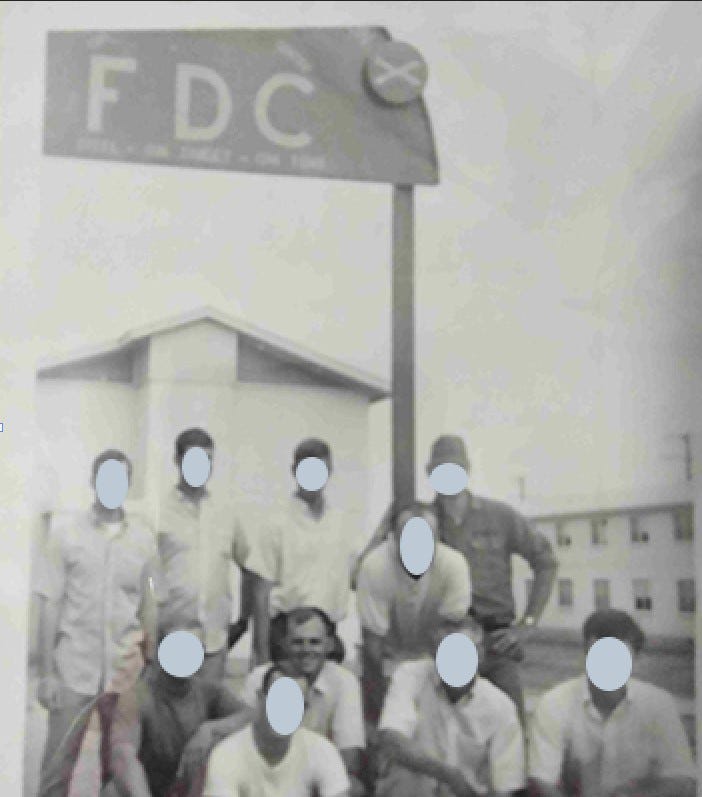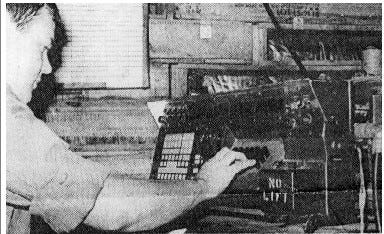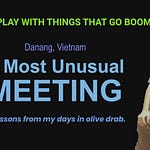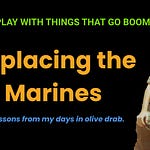Click the audio player above or read the transcript below.
Finally, I was on my way to Advanced Individual Training (AIT).
When I arrived at Fort Sill, Oklahoma, I was directed to the barracks that would be my home for the next two months. And even though it was a barracks, it had a nice feel to it.
The area where I was assigned had more space than I had back at Fort Polk and it had lockers that served as a wall separating me from the bunk next to me. Not a foot locker, mind you. An actual locker where you could hang up your clothes and store personal items.
It was luxurious.
The sergeant was friendly and helpful.
He let us know how the program worked. We were to keep the barracks clean, and he was responsible to see that we stayed in good physical shape and got to the various places where we would receive our training.
But he made it clear our main work over the next two months would happen in the classroom. We had to learn this thing called Fire Direction Control (FDC).
(NOTE: Sorry about the blanked out faces, but in this age I don’t feel I should share their images online without permission. I’m the one face that is visible.)
Most of us didn’t really know what Fire Direction Control was.
We learned quickly.
When soldiers out in the field needed artillery support, they would call us and it would be our job to do the math and then pass along a shooting solution to the soldiers manning the gun crews.
If our soldiers were under fire — a contact fire mission — they needed the shells to be landing right away. Speed mattered.
NOTE: Animated GIF from https://bestanimations.com
And if we did our job correctly, the artillery shells would land where they were supposed to land, which might be a couple of miles away from our position.
But if we didn’t do our job correctly, the artillery shells might land somewhere they shouldn’t land, possibly even on our own troops.
So, the motivation was there to do the job quickly and perfectly.
Our work day during training was basically eight hours.
We learned how to read topographical maps because the soldiers calling us would give us grid coordinates. We had to locate the grid coordinates on the map, determine it’s altitude, and compare it to the altitude of our position.
Then we would calculate where to have the men on the guns point their cannons, what angle their barrel should be at, and what charge they should use to launch the explosive shell.
We learned how to handle radio communications in high stress situations, reviewed basic first aid, and types of things to look out for in jungle fighting.
We were told that at the end of our training we would take exams and the top scorers would be sent to NATO forces in Europe and the rest would most likely be sent to Vietnam.
I have to admit that going to Europe sounded very intriguing, but I was a little concerned about the thought process of our decision makers. Why wouldn’t the very best in our group go to where a war was being fought?
But that decision was politics and therefore way above my pay grade, which I have to admit was very low.
We did exercises and maintained our skills on those “weapons of war” things, but the sergeant was right. Most of our time was spent in the classroom
And I enjoyed that.
What can I say? I always enjoyed school.
Not only did we have regular hours but we also had weekends off.
Life was good.
A SURPRISE
And then I received a very nice surprise.
A friend of mine in California said they had relatives in Oklahoma and wondered if I would like to visit them one weekend. I said sure and it wasn’t long before the Oklahoma family picked me up at Fort Sill and drove me to their house.
They were a wonderful hosts - husband, wife, daughter, and son.
I was given the son’s bedroom — I hope he didn’t mind — and the daughter, Ellen, was given the job of being my tour guide for this area of Oklahoma. I had some excellent home cooked meals, pleasant conversations, and a wonderful experience.
And Ellen was a great tour guide.
It was a fantastic weekend.
There was only one problem …
When the weekend was over I returned to the barracks.
I had been living in an Army barracks for so long that I had become used to it. But the second I walked into the barracks after returning from my weekend with a nice family, I realized Army life was a different world.
It took me several days to get back into the Army flow.
Freddie is a Friend
After learning how to take calls from the field and calculate them manually to send instructions to the gun crews, we were introduced to a new friend — Freddie.
Freddie wasn’t its real name. Officially it was FADAC — Field Artillery Digital Automatic Computer.
But just about everyone called it Freddie. This little computer was designed to take the information from the field and quickly and accurately generate a shooting solution.
Which made me wonder … If a computer could do the calculations, why did they need us?
Sure, we had to type in the information, but couldn’t anyone do that?
Well, we were the backup.
We checked Freddie’s work to make certain it matched our manual calculations, and if anything should happen to Freddie, we became the primary source of a shooting solution.
So I guess we did have a purpose.
The Mile
As we finished up our course at Fort Sill, we took a number of tests. These tests really didn’t matter that much. The Army just needed the scores to record in our files.
The test that I remember was the mile run.
It was a very nice day and I felt good. We were on a regular track so a mile was just four laps. The sergeant lined us up and gave us the command to go. I took off and it felt good as I ran.
NOTE: Image created by DALL-E
I had run track and cross country in high school and knew how to pace myself, and even wearing the long pants and the Army boots didn’t slow me down.
On the final lap I wasn’t worried about my time. I knew I would be well under the 8 minute requirement.
As I crossed the finish line the sergeant called out the time.
“Five minutes, four seconds.”
What?
I was bummed.
I just ran my personal best.
If the sergeant had called out the times as we were running our laps, I would have picked up my pace and I certainly would have sprinted at the finish.
I had never broken the five minute mark. I really wish I would have known. It would have been a nice way to finish my final timed mile run in the Army.
I consoled myself that it was a good showing since I had to run in combat boots, but the fact is, I have never broken the five-minute mile.
The Final Exam
But there was one exam that did matter.
That was the written exam everyone had to take and pass if they wanted to graduate from the Fire Direction Control school.
I didn’t have to cram for this exam. I worked very hard to master the material as it was presented, so the night before the exam I was able to relax and think about my future adventures in the United States Army.
Would it be Europe?
Would it be Vietnam?
Would it be somewhere else?
I remember taking my seat in the classroom and the exams being passed out. It was a timed exam, so when we were given the “start” command, I set right to work.
I was surprised at how easy it was. Every problem seemed straight forward and I was able to answer the questions quickly.
When I finished the last problem in the exam booklet, I looked at the clock and there was still almost one hour left.
I looked around the room and everyone … as in everyone … was hard at work on the exam.
We couldn’t leave early, so I closed my exam booklet and just watched people. No one finished. Everyone was working hard on the exam.
I didn’t know what the problem was. The test was easy. They should have all finished it quickly.
I laid my head on the table, closed my eyes, and fell asleep.
I don’t know how long I was asleep, but when I woke up I checked the clock and there were still about 15 minutes left.
And people were still working.
So I decided I might as well go back and review my answers.
I opened up the test booklet and decided to go through the exam booklet from the last question to the first just for variety.
The first problem I checked — which was the last problem in the exam — was wrong. I couldn’t believe I wrote down the wrong answer. It was an easy fix. Maybe it was good I had this time to check my work.
The next problem I checked was also wrong. How could that be? It was an easy problem.
I quickly glanced through the rest of the exam.
A whole bunch of my answers were wrong.
This was serious!
Going into supercharge mode, I reviewed as many problems as I could before time ran out. It was a good thing I did, because I had to make all kinds of corrections.
The only thing I could attribute it to is that I must have been asleep while answering questions before I lay my head on the table and actually fell asleep.
Time was up and we handed our papers in.
I apparently fixed enough of the answers in order to pass, but I would definitely not be going to Europe.
Still, I had successfully finished the course.
I was now officially a “Field Artillery Operations and Intelligence Assistant” or, in Army lingo, my MOS was 13E20.
Now I would get one month of leave before being sent to my next duty station, which was this place called Vietnam.
An Offer You Can’t Refuse … Unless You Do
But I wasn’t completely done.
The Army had one more thing for us to do before we left Fort Sill. They set up meetings where we would be pitched offers to take part in a couple of Army programs.
YOU CAN FLY!
The first offer was a meeting with an airborne recruiter. Yep, the guys we sang about back in Basic Training. Well, not actually the Airborne Rangers, just the airborne guys. You know, the guys who jumped out of planes … wearing parachutes.
They offered us the opportunity to “earn our wings.” The guy describing it made it sound very appealing. It was a three week course that would begin immediately, which meant I would have to delay my return home for three more weeks.
I gave it serious consideration. It was actually something I wanted to do and figured if I didn’t do it in the Army for free I probably wouldn’t do it in the future.
But three more weeks?
After four months in the Army, I decided I deserved to go home on leave right away.
So I passed on that opportunity
LAB RATS WANTED
The second offer was a little easier to make a decision on.
They wanted volunteers to serve in a research project. We would be stationed in … I believe it was New Jersey … and during most of our time we would be free of responsibilities so we could enjoy the sights on the East Coast.
I had never been to the East Coast and it sounded fun to actually visit the places I had read about in the history books.
But then he explained what we would be doing.
The research project was testing the effectiveness of drugs on various conditions — he didn’t explain what those conditions were. Some volunteers would be placed in a control group receiving a placebo while the others would receive the drug being tested.
He tried to assure us that they wouldn’t let anything bad happen to us, but the idea of being a lab rat was very unappealing to me.
So I passed on that opportunity.
I was going home!
I do have a few lessons from my time in AIT that I think are valuable.
Don’t fall asleep during a test.
I’m sorry this one is even on the list, but you can trust me on this, falling asleep while taking a exam that could impact your future is not a good idea. In fact, it’s a very bad idea. Don’t do it.Consider being a host family.
It may seem like a little thing, or it may seem overwhelming to you, but I would encourage you to at least consider being a host for someone in need. That one weekend fifty-two years ago has made an impact on my life. Aside from the memories of meeting some wonderful people, it has also encouraged me to reach out to others and offer a little hospitality.Consider your options carefully before becoming a lab rat.
I’m all for the advancement of science, and I know the importance of controlled experiments, but don’t sign up to be a lab rat just to get something fun for you. Now you may have a disease that doesn’t have a cure at the moment — cancer or something like that. In that case, volunteering to be a lab rat … test subject … might be a good thing to do.Don’t pass up once-in-a-lifetime opportunities because of little inconveniences.
I had my chance to jump out of an airplane when I was in the Army, but I turned down the opportunity because the school was three weeks long and I wanted to get home right away. That is one of those decisions I wish I could have a re-do on.
Thanks for listening to this episode.
If you enjoyed it, please share it with your friends.
In the next episode, “I’m Leaving on a Jet Plane,” I’ll describe how I began my trip to Vietnam. It didn’t go quite the way I thought it would.
Now before I go, I'd like to share a blessing with you from the Old Testament.
“May the Lord bless and protect you; may the Lord’s face radiate with joy because of you; may he be gracious to you, show you his favor, and give you his peace.”
Numbers 6:24-26 (The Living Bible)



















